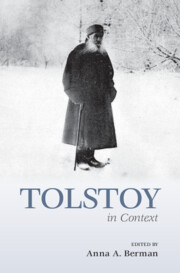Book contents
- Tolstoy in Context
- Tolstoy in Context
- Copyright page
- Contents
- Figures
- Notes on Contributors
- Preface
- Acknowledgments
- Note on Citations, Translations, and Transliterations
- Chronology
- Part I The Man
- Part II Russian Social and Political Contexts
- Chapter 5 Peasants and Folklore
- Chapter 6 The Great Reforms
- Chapter 7 Nobility and the Russian Class System
- Chapter 8 The Russian Orthodox Church
- Chapter 9 Law
- Chapter 10 Politics
- Chapter 11 War and the Military
- Chapter 12 Tolstoyans
- Chapter 13 Clothing
- Chapter 14 The “Woman Question”
- Chapter 15 The Family
- Part III Literature, the Arts, and Intellectual Life
- Part IV Science and Technology
- Part V Beyond Russia
- Part VI Tolstoy’s Afterlife
- Suggested Further Reading
- Index
Chapter 9 - Law
from Part II - Russian Social and Political Contexts
Published online by Cambridge University Press: 05 January 2023
- Tolstoy in Context
- Tolstoy in Context
- Copyright page
- Contents
- Figures
- Notes on Contributors
- Preface
- Acknowledgments
- Note on Citations, Translations, and Transliterations
- Chronology
- Part I The Man
- Part II Russian Social and Political Contexts
- Chapter 5 Peasants and Folklore
- Chapter 6 The Great Reforms
- Chapter 7 Nobility and the Russian Class System
- Chapter 8 The Russian Orthodox Church
- Chapter 9 Law
- Chapter 10 Politics
- Chapter 11 War and the Military
- Chapter 12 Tolstoyans
- Chapter 13 Clothing
- Chapter 14 The “Woman Question”
- Chapter 15 The Family
- Part III Literature, the Arts, and Intellectual Life
- Part IV Science and Technology
- Part V Beyond Russia
- Part VI Tolstoy’s Afterlife
- Suggested Further Reading
- Index
Summary
The chapter questions whether Tolstoy’s ideology was weakening the legitimacy of imperial legality. Beginning with an overview of the state of Russia’s legal system, the chapter examines Tolstoy’s first encounters with the law as a student at Kazan University, his evaluation of public access to justice after the liberal reforms of the 1860s to 1870s, and his ideas of rule of law in general. Disappointed in law as a field of independent expertise, Tolstoy became more interested in true power, which he believed one could find in oneself by understanding the purpose of life. In order to obtain this power, he turned to literature, which he found to be much stronger than law. In his writing he could criticize both the social and political systems in which people participated and the way they had been conditioned not to recognize the horrors of these systems. The most disturbing example Tolstoy witnessed personally was people being forced to serve in the army during war and told that it was their sacred duty to kill. Believing, like his hero Jean-Jacques Rousseau, that the conditions of society corrupt people’s natural goodness, Tolstoy made it his mission to save people from such false ideas and actions being legally and socially imposed upon them.
- Type
- Chapter
- Information
- Tolstoy in Context , pp. 68 - 74Publisher: Cambridge University PressPrint publication year: 2022

